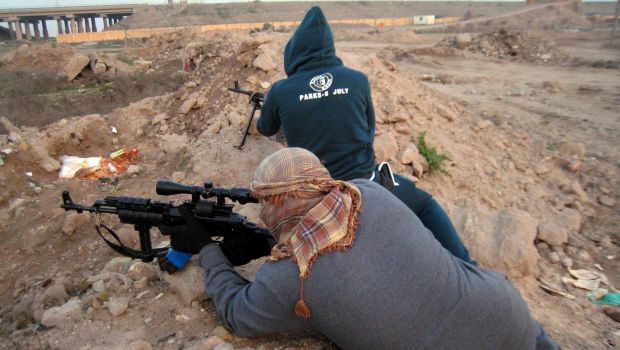
In this Thursday, Jan. 23, 2014 photo, gunmen take up combat positions in Fallujah, Iraq. (AP Photo)
Ali Al-Shalah, an SLC member of parliament, told Asharq Al-Awsat: “The time for these initiatives has ended and we cannot talk about it at a time when the noose is being tightened around the neck of the Islamic State of Iraq and Syria (ISIS) organization by the army with direct support from Anbar tribes.”
In an interview with Al-Baghdadiyah TV in Ramadi, the center of the province, Hatim said the government created the crisis in the province by targeting civilians with air strikes and denying the protesters their legitimate rights, adding that he was prepared to meet Maliki on condition that he came to Anbar.
The cities of Ramadi and Fallujah in Anbar were taken over by insurgents in late December. They expelled government forces after more than a year of widespread protests by Anbar Sunnis against what they said was the sectarian prejudice of the central government in Baghdad, led by Shi’ite prime minister Maliki.
Some of the insurgents are reported to be members of radical jihadist groups affiliated with Al-Qaeda, such as ISIS. Government forces have surrounded the cities, and have been attempting to recapture them with the assistance of local tribal fighters.
Responding to Hatim’s comments, Shalah said: “When the government started to strike the ISIS insurgents they said these were tribal revolutionaries, which was a fallacy that was later exposed.”
Shalah added: “The United States and Russia have revealed clusters of ISIS hideouts using satellites, and ISIS has declared Fallujah an Islamic emirate and started to govern people there.
“Despite the rumors and to avoid confusion, we look at all those who fire at the military forces as members of ISIS, regardless of what they call themselves.”
Shalah said it was too early to discuss political initiatives to end the fighting, and the government’s immediate priority should be “its campaign against terrorism.”
Meanwhile, Sheikh Abdel-Karim Al-Fahdawi, leader of the Boufahd tribe which is fighting alongside government forces in Anbar province, told Asharq Al-Awsat that “jumping to conclusions was not acceptable.”
Responding to Hatim’s comments, he said: “The questions that need answering are: who displaced families from many areas of Ramadi and Fallujah? And who took over police stations, expelled the police officers, and burnt [the police stations] down, and even burnt down houses?
“Whoever denies the presence of ISIS in Anbar must be living on another planet.”
Fahdawi denied reports that the bombardment of Fallujah had caused the displacement of civilians. He said: “This is not true because the displacement and expulsion of local administrators, especially in Fallujah, started before the army arrived, and the situation became more complicated, which is what happened in Ramadi, where the situation remained complicated and fighting continued with attacks and counterattacks.”
He added: “Military operations are not perfect, and these insurgents have pockets and hideouts, and whenever one area is cleared, they return to it making the issue more complicated.”
Medical officials and local tribal leaders said at least seven people were killed by government artillery fire in Fallujah on Sunday, and dozens more injured.
Meanwhile, Anbar Provincial Council has called for a new national conciliation process between the central government and the province. Governor of the province, Sabah Karhout, said: “We call on the central government in Baghdad to launch a new national conciliation with the Anbar Province to stop the bloodshed and achieve national conciliation among all Iraqis.”
